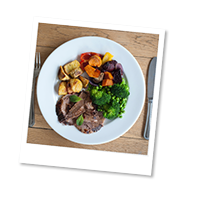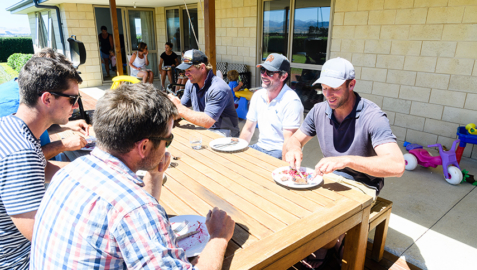Nutritionist Sarah Percy and farmers on eating well
Nutritionist Sarah Percy explains how ‘fuelling up’ with the right food and staying hydrated are essential for maintaining energy levels and keeping healthy especially during …
The food you eat contributes significantly to the energy you need to perform at your best.
Those working on the farm know the importance of carefully monitoring what their stock eat, but can neglect their own nutrition.
Farmstrong asked farmers to send us their questions on how to eat well. Nutritionist Sarah Percy explains why ‘fuelling up’ with the right food and staying hydrated are essential. She shares tips on how to maintain your energy levels throughout the day.
 Eating well is about balance. Learn what good looks like. This delicious roast has everything from the different food groups in the right proportions - a ¼ plate protein, ¼ plate carbs and ½ a plate of colourful vegetables.
Eating well is about balance. Learn what good looks like. This delicious roast has everything from the different food groups in the right proportions - a ¼ plate protein, ¼ plate carbs and ½ a plate of colourful vegetables.
If you find yourself coming in after a hard day and feeling irritable, it may be ‘hanger’ (hungry, anger) caused by low blood sugar levels. Eat regular meals, which include some protein. If needed, snacks in between meals will keep your blood sugars constant and minimise ‘hanger’.
When you cook a casserole, bolognese, curry or soup, cook a double batch and freeze half. In no time you’ll have a freezer ‘food bank’ to use when your under the pump.
Have adequate protein at each meal, as this helps you feel fuller for longer after eating. You can increase your protein at breakfast by including poached or scrambled eggs with wholegrain toast. Or, if you prefer cereal, add in some yoghurt, nuts and seeds to ‘amp up’ the protein content. Having a milk, yoghurt or fruit smoothie with your breakfast is another quick and easy option for a nourishing drink that keeps you going for longer.
If your work is physically demanding, make sure you have snacks to keep you going between meals. Snacking isn’t a bad thing as long as we choose healthy options to fuel us.
After going without food overnight, it’s important to refuel your body for the day, so have a ‘grab and go’ option before heading out early. Something quick and small is all that you need if another breakfast is due later. It’s all about being prepared.
I recommend a smoothie, peanut butter on toast or even muesli or porridge that you have ready to go the night before. This will streamline your morning and make it more likely to happen.
Firstly, look at the 100g column on the nutrition panel and aim for less than 2g saturated fat and less than 10g sugar. A good rule of thumb for the fat content is to aim for less than 10g fat per 100g. I also recommend looking at the ingredients to see where the fat is coming from, so you stay clear of unhealthy fats.
For example, if the food has lots of nuts and seeds it will be higher in fat, but will actually be providing some valuable nutrients. If the fat is coming from palm oil or hydrogenated fat, it would be better go for a lower content of fat or buy a different product as these fats are not healthy for us.
Ideally, we want to match our food intake with our exercise and lifestyle to keep a balance. Putting on weight when we aren’t as active can result in fat being stored around the belly, which can have negative health implications. However, if we lose weight too quickly we can deplete our glycogen stores – this is the fuel in our muscles that keeps us active longer. We can also suffer fluid and muscle mass loss, so we feel tired and weaker.
The best option is to eat healthy food and get regular exercise. This helps lose stored fat while maintaining our muscle mass.
Aim to eat a balanced diet with a variety of foods. Have a good mix of nutrients and ensure you have plenty of high protein foods (meat, fish, chicken, eggs, dairy, nuts, seeds, legumes) at each meal, to stop your blood sugar levels from fluctuating too much.
Remember that food is just one factor in feeling tired. We also need to ensure we’re sleeping well, managing stress, having downtime and exercising, as these lifestyle factors also affect our energy levels.
I would discuss your tiredness with your GP too, as you may need to have some blood tests to check your nutrient levels. For example, low iron levels can cause fatigue.

Nutritionist Sarah Percy explains how ‘fuelling up’ with the right food and staying hydrated are essential for maintaining energy levels and keeping healthy especially during …

Sam Whitelock shares great advice on eating well. Find out what works for you and lock it in.

Eating well gives your body the energy and nutrients it needs to perform at its best. That’s why a nutritious diet and regular meals are …